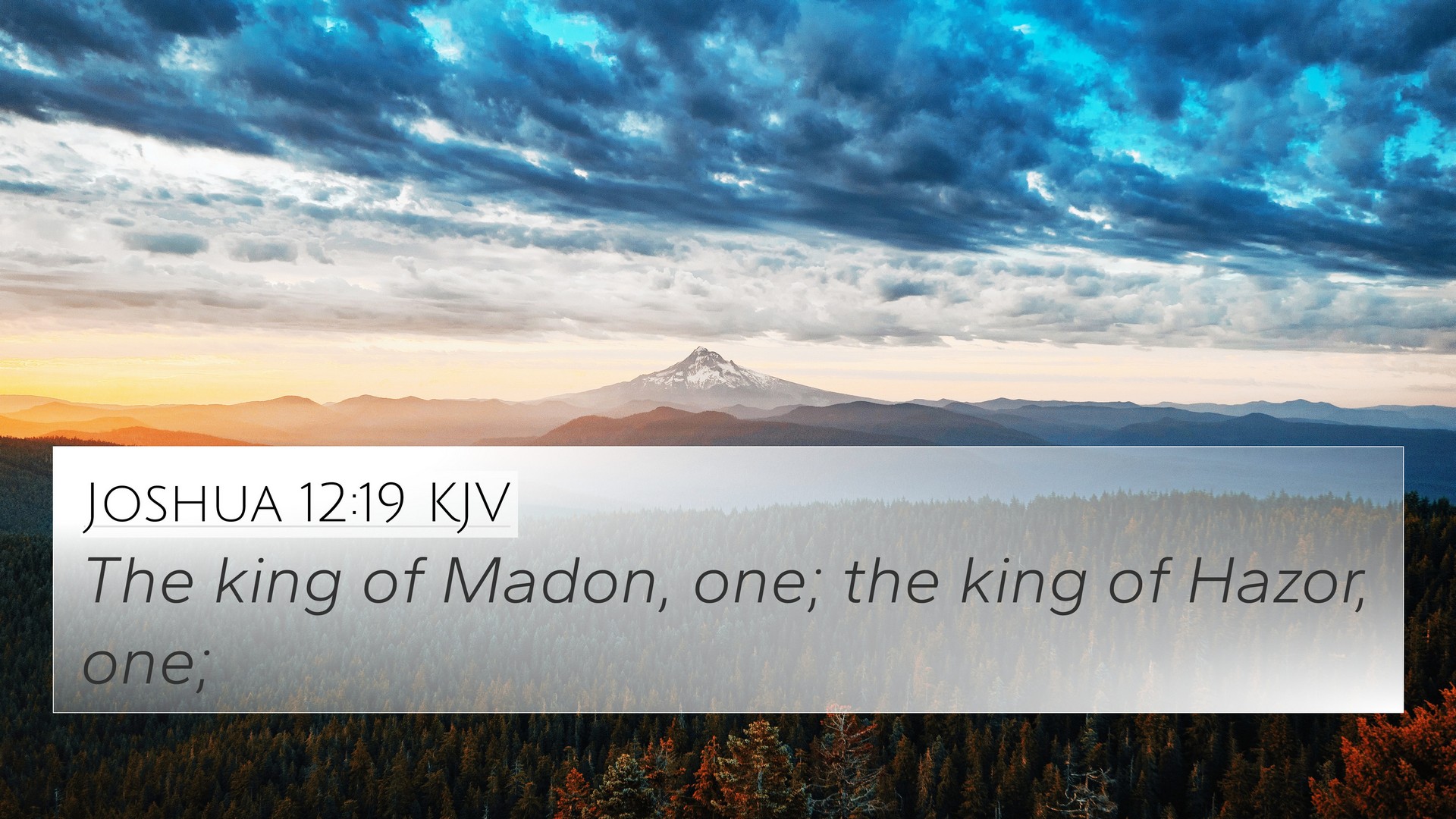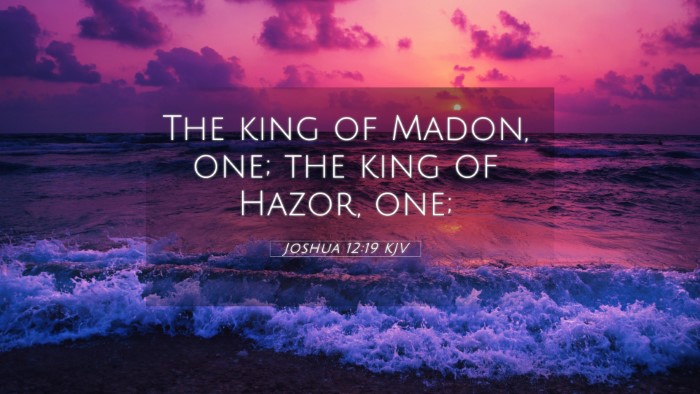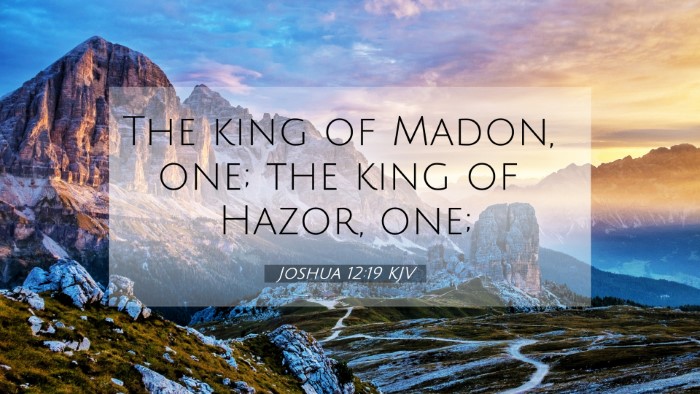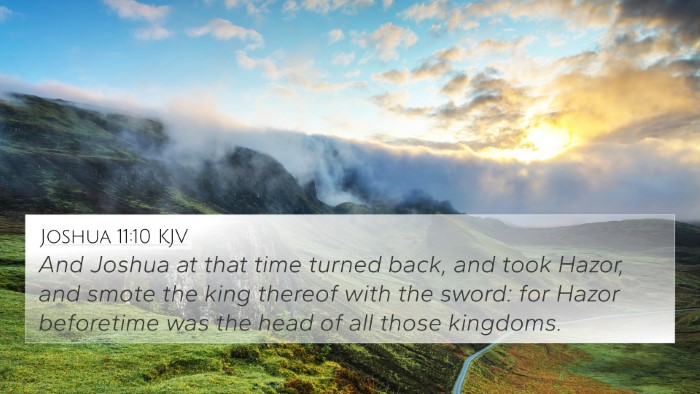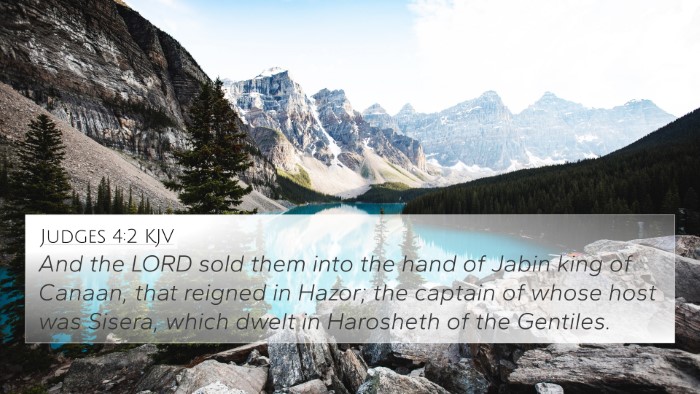Meaning and Interpretation of Joshua 12:19
Joshua 12:19 states: "The king of Debir, one; the king of Geder, one;," reflecting a record of the conquered kings as Israel took possession of the Promised Land. This verse is a part of the broader narrative of Joshua's conquests, detailing the victories over various city-states and their rulers.
Contextual Overview
The book of Joshua presents a historical account of Israel’s transition from nomadic existence to settlement in Canaan. The enumeration of the defeated kings serves not only as a chronicle of military victories but also emphasizes God’s faithfulness to His promises regarding the land.
Commentary Insights
- Matthew Henry: Henry emphasizes the importance of acknowledging God's power in these conquests. He notes that the mention of each king assists the reader in understanding the scope of God's deliverance to Israel. Each name may remind Israel of the individual struggles and triumphs, reinforcing their identity as God's chosen people.
- Albert Barnes: Barnes discusses how these kings represent the various strongholds within the land and illustrates the totality of God’s victory over them. The inclusion of multiple kings and their territories signifies the comprehensive nature of Israel’s victories, encouraging believers to see the completeness of God’s work in their lives.
- Adam Clarke: Clarke highlights the geographical and historical significance of these cities and their rulers in the larger narrative of Israel's conquest. He also points out that the listing of these kings serves as a fulfillment of God’s promise to Abraham regarding the land, thus linking this verse back to the roots of Israel’s heritage.
Thematic Connections
This verse has notable thematic connections to the following:
- Promises of God: Relating to Genesis 15:18-21, where God promises the land to Abraham's descendants.
- Victory in Christ: Seen through the lens of Romans 8:37, "Nay, in all these things we are more than conquerors through Him that loved us."
- God as a Deliverer: Referencing Exodus 6:6 where God promises deliverance from bondage, paralleling Israel's conquest.
- Historical Accounts of Conquest: Linking to Joshua 1:3-5, where God instructs Joshua about the territories to be claimed.
- The Nature of Warfare: Seen in Ephesians 6:12, which talks about spiritual warfare, reflecting the physical battles fought by Israel.
- Faithfulness to God’s Warnings: Highlighted in Deuteronomy 7:2, where God warns of the consequences of idolatry amidst the nations conquered.
- Judgment upon Nations: As seen in Revelation 19:19, emphasizing the finality of God's judgment.
Bible Cross-References
Here are some essential cross-references for a deeper understanding and connection to Joshua 12:19:
- Joshua 1:3 - God’s promise of land.
- Deuteronomy 7:2 - Warning against intermarrying with conquered nations.
- Genesis 15:18-21 - The promise to Abraham regarding the land.
- Romans 8:37 - Assurance of victory through Christ.
- Exodus 6:6 - God’s promise of deliverance.
- Ephesians 6:12 - The spiritual nature of our battles.
- Psalm 44:3 - The inheritance of the land through God’s hand.
- Revelation 19:19 - Final judgment upon nations.
Conclusion
In conclusion, Joshua 12:19 is not just a historical account but a rich narrative filled with theological significance. The listing of the kings signifies God’s faithfulness to Israel and reflects the larger themes of conquest, divine promise, and the nature of God’s assistance in times of struggle. By examining cross-references and employing tools for Bible cross-referencing, believers can deepen their understanding and find connections throughout the scriptures, illuminating the inter-Biblical dialogue that exists within the text.
Further Study Suggestions
For those interested in exploring more about identifying connections between Biblical texts, consider looking into:
- How to use Bible cross-references for personal study.
- Resources for comprehensive Bible cross-reference materials.
- Various methods of cross-referencing Bible study for sermon preparation.
- Understanding the links between Old Testament and New Testament scripture.
